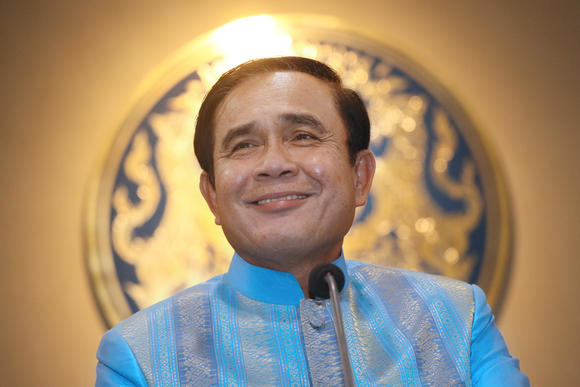-
Tips for becoming a good boxer - November 6, 2020
-
7 expert tips for making your hens night a memorable one - November 6, 2020
-
5 reasons to host your Christmas party on a cruise boat - November 6, 2020
-
What to do when you’re charged with a crime - November 6, 2020
-
Should you get one or multiple dogs? Here’s all you need to know - November 3, 2020
-
A Guide: How to Build Your Very Own Magic Mirror - February 14, 2019
-
Our Top Inspirational Baseball Stars - November 24, 2018
-
Five Tech Tools That Will Help You Turn Your Blog into a Business - November 24, 2018
-
How to Indulge on Vacation without Expanding Your Waist - November 9, 2018
-
5 Strategies for Businesses to Appeal to Today’s Increasingly Mobile-Crazed Customers - November 9, 2018
Thai Junta head says election will be held in 2017
Following Thailand’s referendum on the new constitution on Sunday, Western governments once again urged the country’s ruling junta to hold a general election as soon as possible and to lift restrictions on the freedom of speech.
Advertisement
“If people cannot speak their minds freely or take part in political activities without fear, how can they meaningfully engage in this referendum”, said Josef Benedict, Amnesty International’s deputy director for Southeast Asia and the Pacific.
The Constitutional Referendum Act: Provides for up to 10 years’ imprisonment for “anyone who disseminates text, pictures or sounds that are inconsistent with the truth or in a violent, aggressive, rude, inciting or threatening manner aimed at preventing a voter from casting a ballot or vote in any direction or to not vote”.
Years of competing protests and instability followed.
Mr Chatchai Na Chiang Mai, spokesman for the Constitution Drafting Committee, told Reuters that there will be an election “at the earliest in September or October 2017 and a new government by December 2017”.
A majority of voters approved the junta-backed Constitution in Sunday’s referendum, following which the European Union and the USA denounced the restrictions on free speech imposed by the junta in the run-up to the vote in which more than 100 opponents were detained, Efe news reported.
The charter “speaks to a lot of worries and concerns that a majority of Thai people have”, Gothom Areeya, a professor at Thailand’s Mahidol University, told the AP. “Many Thais want to see an end to corruption and the return of peace and development. Even though experts like me may criticize it a lot, our message just didn’t reach a lot of the people”.
Thailand’s Election Commission said that with 91 per cent of the votes counted, 61 per cent have voted in favour.
50 million eligible voters to participate in the referendum. Also, it requires a military-appointed Senate to name a prime minister – in effect a leader controlled by the military. Jatuporn Prompan, the UDD chairman, said the referendum should not have been held under such conditions.
The bitterly divided kingdom has been ruled by a junta for two years since its elected government was booted from office.
The Senate will include commanders of the army and other security services.
Nearly two years ago, the military took over the government, toppling the democratically-elected government led by Prime Minister Yingluck Shinawatra.
– Emergency decrees enacted by the junta without any parliamentary consent remain valid.
Analysts say the new constitution would make it easy to disband parties, keep politicians in line, impeach politicians, and enforce a coalition government of weaker, smaller parties. The fact that we’ve come this far is our best effort despite everything that has happened.
While approval of the constitution will lead re-installing an elected government, it will be a weaker one than before the coup. But critics, among them major political parties, say it aims to enshrine the military’s political role for years to come. King Bhumibol Adulyadej, whose righteous rule has anchored the kingdom since 1946, is 88 and ailing.
Two populist prime ministers, Thaksin Shinawatra and his sister, Yingluck Shinawatra, were elected with the support of rural, northern voters.
Advertisement
The upper house will keep elected lawmakers in check, while courts and other watchdog bodies will be given increased powers – despite already being accused of political bias. “We have seen that the military government can use Article 44 to solve its short-term problems, but how is that going to solve our long-term issues?”





























